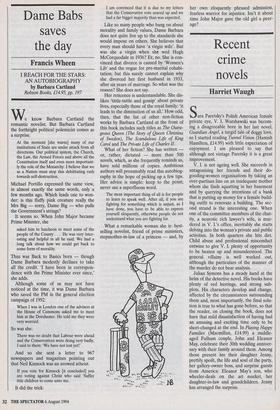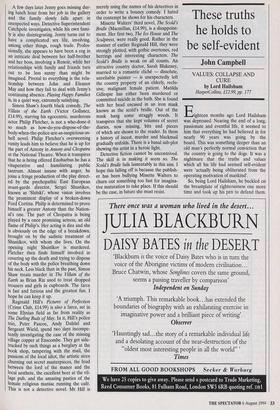Recent crime novels
Harriet Waugh
Sara Paretsky's Polish American female private eye, V. I. Warshawski was becom- ing a disagreeable bore in her last novel, Guardian Angel, a turgid tale of doggy love, so I started reading Tunnel Vision (Hatnish Hamilton, £14.99) with little expectation of enjoyment. I am pleased to say that although not vintage Paretsky it is a great improvement.
V. I. is not ageing well. She succeeds in antagonising her friends and their do- gooding-women organisations by taking an over-partisan line on an inadequate mother whom she finds squatting in her basement and by querying the intentions of a bank that is putting up money for a female build- ing outfit to renovate a building. The sec- ond strand is the interesting one. When one of the committee members of the char- ity, a neurotic rich lawyer's wife, is mur- dered in V. I.'s office, inevitably she starts delving into the woman's private and public activities. In both quarters she hits dirt. Child abuse and professional misconduct entwine to give V. I. plenty of opportunity to be beaten up and misunderstood. The general villainy is well worked out, although the particulars of the manner of the murder do not bear analysis.
Julian Symons has a steady hand at the helm of the detective novel. His books have plenty of red herrings, and strong sub- plots. His characters develop and change, affected by the circumstances surrounding them and, most importantly, the final solu- tion is true to what has gone before, so that the reader, on closing the book, does not have that mild dissatisfaction of having had an amusing and exciting time only to be short-changed at the end. In Playing Happy Families (Macmillan, £14.99) a middle- aged Fulham couple, John and Eleanor May, celebrate their 30th wedding anniver- sary with their family around them. Among those present are their daughter Jenny, prettily spoilt, the life and soul of the party, her gallery-owner boss, and surprise guests from America: Eleanor May's son, who wheeler-deals on the art market, her daughter-in-law and grandchildren. Jenny has arranged the surprise. A few days later Jenny goes missing dur- ing lunch hour from her job in the gallery and the family slowly falls apart in unexpected ways. Detective Superintendent Catchpole investigates, while his own fami- ly is also disintegrating. Jenny turns out to have a complicated sex life, involving, among other things, rough trade. Profes- sionally, she appears to have been a cog in an intricate deal between her half-brother and her boss, involving a Renoir, while her relationships with family and friends turn out to be less sunny than might be imagined. Pivotal to everything is the rela- tionship between John and Eleanor May and how they fail to deal with Jenny's continuing absence. Playing Happy Families is, in a quiet way, extremely satisfying.
Simon Shaw's fourth black comedy, The Villain of the Earth (Victor Gollancz, £14.99), starring his egocentric, murderous actor Philip Fletcher, is not a who-done-it so much as how-do-you-dispose-of-the- body-when-the-police-are-as-suspicious-as- hell novel. Philip Fletcher's overweening vanity leads him to believe that he is up for the part of Antony in Antony and Cleopatra at the National Theatre. When it transpires that he is being offered Enobarbus he has a vituperative and humiliating public tantrum. Almost insane with anger, he joins a fringe production of the play direct- ed by the psychopathic East European avant-garde director, Sergei Shustikov, known as Shitskr, whose vision involves the prominent display of a broken-down Ford Cortina. Philip is determined to prove himself a greater Antony than the Nation- al's one. The part of Cleopatra is being played by a once promising actress, an old flame of Philip's. Her acting is dire and she is obviously on the edge of a breakdown, brought on by the sadistic treatment of Shustikov, with whom she lives. On the opening night Shustikov is murdered. Fletcher then finds himself involved in covering up the death and trying to dispose of the body with the police breathing down his neck. Less black than in the past, Simon Shaw treats murder in The Villain of the Earth as Brian Rix used to treat dropped trousers and girls in cupboards. The farce is fast and furious and the greatest fun. I hope he can keep it up.
Reginald Hill's Pictures of Perfection (Crime Club, £14.99) is also a farce, set in some Elysian field as far from reality as The Darling Buds of May. In it, Hill's police trio, Peter Pascoe, Andy Dalziel and Sergeant Wield, spend two 'days incompe- tently investigating the case of the missing village copper at Enscombe. They get side- tracked by such things as a burglary at the book shop, tampering with the mail, the passions of the local idiot, the artistic siren churning out secret masterpieces, the feud between the lord of the manor and the local aesthete, the excellent beer at the vil- lage pub, and the amazing pasties of the female religious maniac running the café. This is not a detective novel. Mr Hill is merely using the names of his detectives in order to write a bouncy comedy. I hated the contempt he shows for his characters.
Minette Walters' third novel, The Scold's Bridle (Macmillan, £14.99), is a disappoint- ment. Her first two, The Ice House and The Sculptress, were really good. Rather in the manner of earlier Reginald Hill, they were strongly plotted, with gothic overtones, red herrings and interesting characters. The Scold's Bridle is weak on all counts. An attractive country doctor, Sarah Blakeney, married to a romantic cliché — dissolute, unreliable painter — is unexpectedly left the country property of an elderly, reclu- sive, malignant female patient. Matilda Gillespie has either been murdered or committed suicide in the bath. She is found with her head encased in an iron mask known as the scold's bridle. Out of the mask hang some straggly weeds. It transpires that she kept volumes of secret diaries, now missing, bits and pieces of which are shown to the reader. In them a history of incest, murder and blackmail gradually unfolds. There is a banal sub-plot showing the artist in a heroic light. Detective fiction cannot be uncontrived. The skill is in making it seem so. The Scold's Bridle fails lamentably in this aim. I hope this falling off is because the publish- er has been bullying Minette Walters to churn out something too fast for imagina- tive maturation to take place. If this should be the case, in future she must resist.



















































 Previous page
Previous page